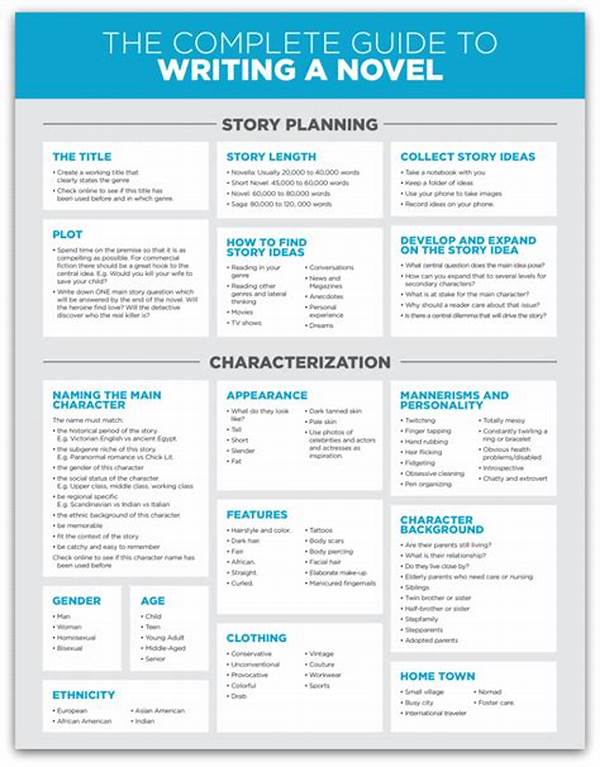In the dimly lit corner of a cozy coffee shop, a writer sits hunched over their laptop, fingers dancing across the keyboard. Their mind, a whirlwind of characters, plots, and emotions, is tethered only by the words that appear on the screen. It is here, amidst the clatter of cups and the soft hum of conversation, that the phases of writing a novel unfold—a journey as tumultuous as it is exhilarating. Among scattered napkin scribbles and the comforting aroma of freshly brewed coffee, a story is being born, pieced together in fits of inspiration and quiet contemplation.
Read Now : Gripping Mysteries With Twists
The Beginning of a Story
Once upon a time, every novel began as a mere flicker of an idea—an ephemeral wisp that beckoned for more. In these initial phases of writing a novel, writers are dreamers. They embrace the dawn of creativity, where ideas spill over like spring blossoms. Characters whisper their secrets, while plots twist and turn like meandering rivers. The world-building begins in earnest, each detail etched with care, breathing life into settings that will soon house grand adventures and poignant moments. Yet, this stage is not just about creation; it’s about wrestling with uncertainty, a dance between clarity and chaos as the story’s skeleton starts to take form. Each keystroke is a brick laid upon the path of an uncharted journey, one that promises countless discoveries and introspections.
But inspiration, fervent and fleeting, must be harnessed. This phase requires more than just imagination; it demands discipline. The writer, like an alchemist, mixes logic with the dream. By establishing a structure and outlining the plot, they transform the abstract into the tangible. These elements of planning may seem mundane, but they are the scaffolding of a masterpiece in the making. The writer’s notebook brims with notes and sketches, as each subsequent phase builds upon lessons learned and insights gained, propelling the narrative from mere idea into crafted story.
Development Through Play and Pause
Every story requires worlds to explore. In these phases of writing a novel, the plot evolves like a melody, each key unlocking new secrets.
1. Characters come to life, revealing more than their creator originally knew, guiding the writer through uncharted lands.
2. Dialogues become music, instrumental in revealing truths that even the narrator may not foresee.
3. Tension builds, the plot twists like a scenic road, revealing landscapes of conflict and resolution.
4. Themes take root, emerging through motifs that speak directly to readers’ hearts.
5. Time, a silent witness, marks each word penned, shaping the tale’s rhythm and pace.
Midway in a Novel’s Journey
As the writer ventures deeper into the heart of their story, they find solace and challenge in equal measure. These phases of writing a novel are marked by expansion and deepening—characters who once were strangers now become intimate confidants, whispering their truths and fears. The plot thickens, weaving intricate tapestries of love, betrayal, and redemption. At this juncture, writers are often caught in the throes of discovery, where every sentence penned opens doors to new pathways and unforeseen consequences. Like a seasoned explorer, the writer navigates uncharted waters, balancing intuition with meticulous planning, steering the narrative toward an inevitable but unseen destination.
Yet, amidst the beauty lies the struggle. The middle sections of a novel can be a mire where writers wrestle with doubt, ambiguity, and the arduous task of maintaining momentum. It is here that perseverance becomes the key, a steadfast commitment to the story’s unfolding. With each page turned, the writer learns to trust the process, to believe in the story they are telling. They draw inspiration from favorite authors, from life itself, knitting these influences into a unique tapestry that bears the stamp of their own imagination. In this creative crucible, the novel begins to shape not just a story, but also a reflection of the writer’s own journey—an odyssey of growth, understanding, and endless possibilities.
Navigating the Challenges
The phases of writing a novel are not without their treacherous terrain. Herein lie the trials that test both creativity and resolve:
1. Writer’s block: A formidable foe that saps inspiration without warning.
2. Self-doubt: Shadows of insecurity that creep upon even the most seasoned scribe.
3. Editing frenzy: A relentless pursuit of perfection, often at odds with creativity.
Read Now : Email Campaigns For Customer Retention
4. Time constraints: The ever-ticking clock that challenges productivity.
5. Feedback: A crucible of critique, both constructive and confounding.
6. Imposter syndrome: The quiet, persistent whisper questioning one’s legitimacy.
7. Burnout: A weariness that tempers passion with fatigue.
8. Motivation swings: The fluctuating desire that waxes and wanes through the journey.
9. Plot holes: Unseen chasms that threaten the integrity of the narrative.
10. Focus drift: A straying mind that dawdles just when concentration is critical.
The Final Stretch
At last, the home stretch appears on the horizon—a culmination of the many phases of writing a novel. In this chapter, the writer becomes the finisher, a sculptor giving definition to their work. The rewrites and revisions are as much about refinement as they are about revelation, for just as characters and plots evolve, so too does the writer. The laborious task of editing now stands as a testament to craft, where each word, each scene is scrutinized, sometimes painfully excised, to bolster the integrity of the narrative.
As the novel edges towards completion, the writer is thrust into a peculiar space—one of pride and apprehension. The story, no longer just ink on pages, feels like a living entity about to take its first steps into the world. Here, courage becomes a vital companion—the courage to let go and share this creation with others, to face their judgments, to begin anew with lessons learned. The phases of writing a novel come full circle, encompassing not just the birth of a story, but the evolution of a storyteller. Each novel penned becomes a chapter in the writer’s own life narrative—one filled with triumphs, tribulations, and the inexhaustible quest for meaning.
Reflection and Resolution
In reflecting on the phases of writing a novel, a writer often finds that the journey is as transformative as the story itself. Each phase marks a step in personal growth and understanding, revealing layers of humanity within the characters—and within the creator. Through struggles and breakthroughs, a writer discovers their voice, mastering the art of storytelling, not just for others, but for themselves.
Ultimately, the completion of a novel is not merely the final period at the sentence’s end—it’s a passageway to new beginnings. With every novel finished, new ideas germinate, and the cycle begins anew. Writing a novel becomes the reflection of a world seen through the writer’s eyes, each word forged in inspiration and etched with intention, forever shaping the literary landscapes of both the mind and the heart.









